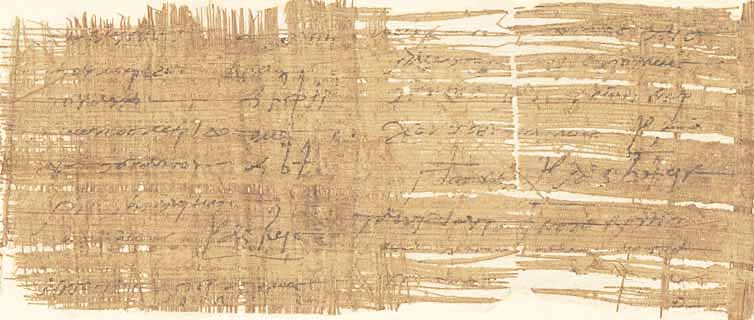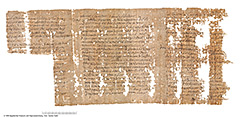BGU II 611 (P. 8507)
Watching an emperor at work: On this papyrus there is a copy of two senatorial speeches of the Roman Emperor Claudius, which deal with reforms of the Roman law courts. Claudius, who was born on 1st August 10 BC. in Lugdunum (now Lyon), ruled from 24th January 41 AD. until his death on 13th October 54 AD. as the fourth emperor of the Roman Empire. His relatively old age at the time of his entry into the government can be explained by the fact that he was excluded from almost all public office and was not considered for ruling the empire due to physical defects. At least this is what the ancient sources say, and they neglect the fact that he was a highly educated person and that he finally showed himself to be capable administrator and ruler during his reign with a special interest in jurisdiction. In this context, the two fragmentary senatorial speeches on this papyrus are to be set and understood.
The papyrus is very special in many ways. First, this text belongs to the rare Latin texts that have been found in Egypt. Although it is expected of a Roman emperor that he delivered his speeches in front of the Senate in Latin, Latin was not the administrative language in all the provinces of the Roman Empire. In Egypt, the administration mostly spoke and wrote Greek. And so, the majority of extant texts from Roman Egypt are written in Greek. Latin, on the other hand, is extremely rare. In addition, Senate speeches by Roman emperors on papyri of Egypt have seldom been preserved. This is not surprising, since these speeches mostly dealt with matters, which affected the province of Egypt indirectly at most. All this shows how valuable this papyrus is.
The papyrus is not completely preserved. Apart from a few larger and smaller lacunae, especially the beginning and the end are missing. Thus, remainders of three columns are preserved, but from the first column the line beginnings are missing and from the third column the line endings are missing. Clearly visible is the end of the first speech in line 7 of the first column. The second speech follows directly and is not finished at the end of the preserved part of the papyrus. Between the individual words of the Latin text points have been set as separators. The papyrus was reused. On the back there is an account of dyke works in Greek.
In the first speech, of which the end is preserved in the first seven lines, the Emperor discusses the reduction of the minimum age for judges to 24 years. He excludes, however, explicitly a college of judges in trials for freedom and slavery. For them, the minimum age of 25 years should continue to apply. He justifies this by saying that such judges should have reached an age in which they are fully responsible for such issues in their private affairs.
Much more has been preserved of the second speech. In it, the Emperor treats the evil of trial filibustering. The emperor blames not only the prosecutors, but also the judges, whom he threatens to curtail the holidays if they do not finish the trials in the prescribed time. To the prosecutors the emperor threatens to dismiss the indictment if they should not appear at court appointments without apology.
Finally, in the last section, he encourages the senators to agree to his proposals only if they actually agree. If they do not, then they should make counterproposals, discuss the issues among themselves or take time to think about what has been said.
The importance of these speeches lies in their content. They give a unique insight into the Roman court system and the ideas of the Roman Emperor Claudius related to it and are thus of great historical importance.



